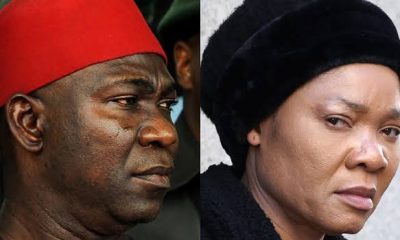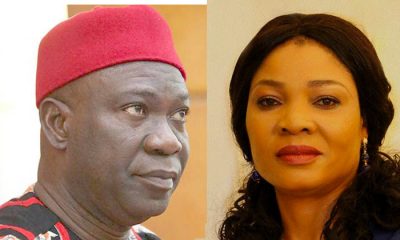News
Financial autonomy for Legislature, Judiciary unconstitutional – Ekweremadu

Former Deputy President of the Senate, Senator Ike Ekweremadu, has faulted the Executive Order No. 10 of 2020 granting financial autonomy to State Judiciary and Legislature, noting that while the intent might be good, the action was unnecessary and unconstitutional.
The former Chairman of the Senate Committee on Constitution Review equally faulted the restrictions of movements and other rights declared by the Federal Government and several states in managing the COVID-19 pandemic, stating that while they were “absolutely necessary”, they “failed the constitutionalism test” and could only be overlooked on the grounds of Doctrine of Necessity.

The Senator, who holds a doctorate degree in Constitutional Law, aired his views while fielding questions on “Political Voices”, a current affairs programme on Dream FM, Enugu on Friday.
“There has been a lot of misconception regarding that Executive Order. In the first place, it was quite unnecessary.
“We, the members of the 8th Assembly, passed the amendment to the Constitution to grant financial autonomy to the State Judiciary and Legislature because we believed that for the sake of their independence, they should be on the First Line Charge of the states Consolidated Revenue Account. And when we passed them, the President dutifully signed them into law (over a year ago).
“That should have been the end of it because the amendments are self-executing.
We expected that having done that, the states should go ahead to work out the modalities. But that didn’t happen.
“So, the President now set up a Committee headed by the Attorney-General of the Federation to work out the modalities for implementation. I think it was at that point that they deemed it necessary to come up with an Executive Order to strengthen the implementation.
“But regrettably, they have simply mutilated those provisions of the Constitution as amended. Now, they are adding some aspects suggesting to the states how to manage their funds because part of that Executive Order is that in the next three years, the judiciary in the states should dedicate part of the monies coming to them to capital projects for the State Judiciary.
“It went ahead to suggest that if the governors fail to remit these monies to State Judiciary and State Legislature, then the President could direct that these monies be transferred straight from the Federation Account to the State Judiciary and Legislature. This in itself was not part of what we amended in the Constitution and it is not part of the Constitution”, he stated.
On the way forward, Ekweremadu advised the Governors to approach the President and point out those mistakes so that he could withdraw the executive order.
“And unfortunately, if they go to court, the implication is that the application of that amendment regarding financial independence of the State Judiciary and State Assembly will be put on hold because so long as they are in court those provisions will not be implemented.
“So, its something the Governors and the Attorney General and the President need to settle amicably”, he admonished.
























